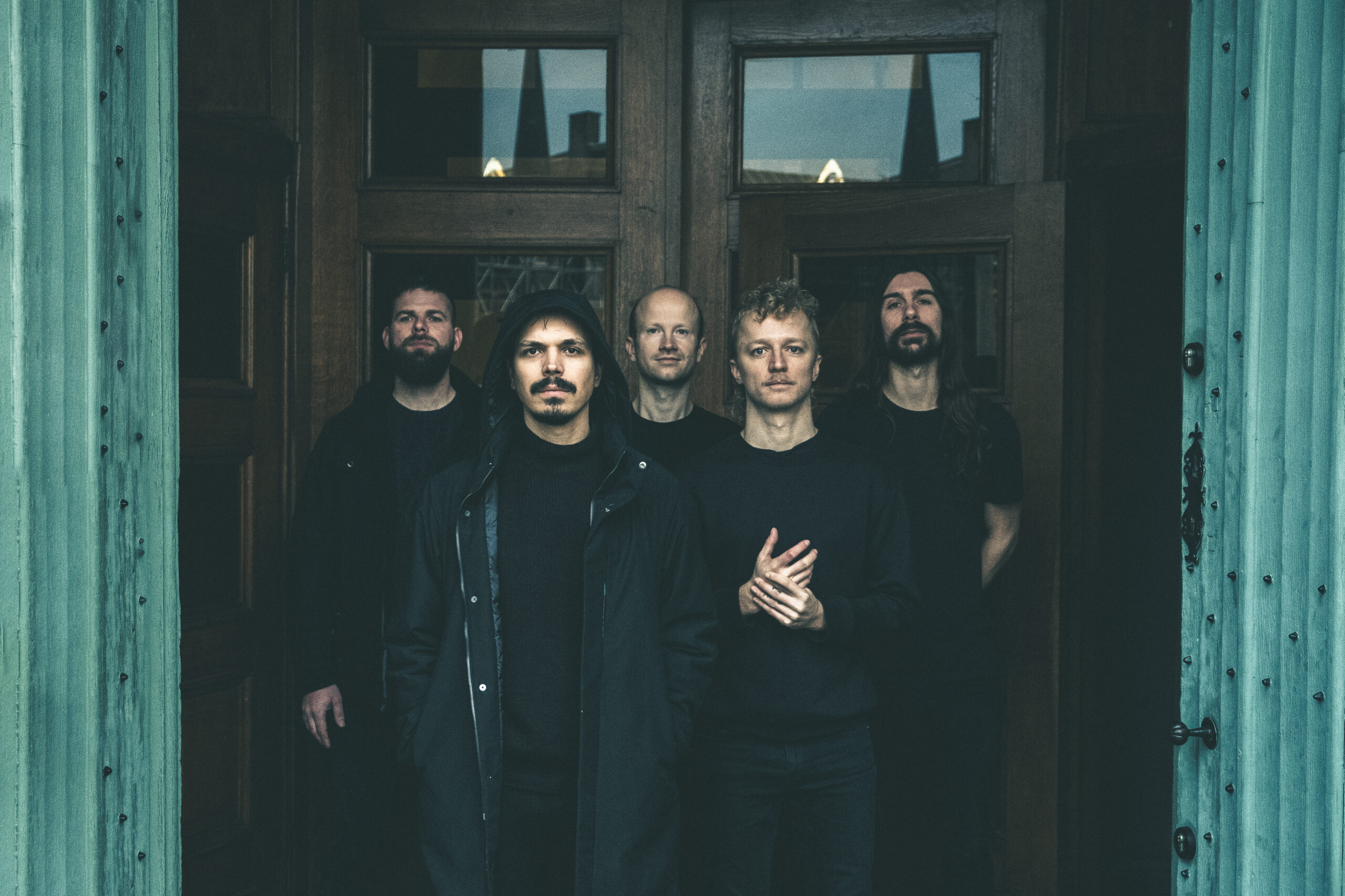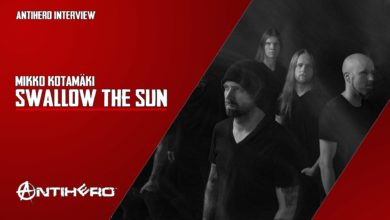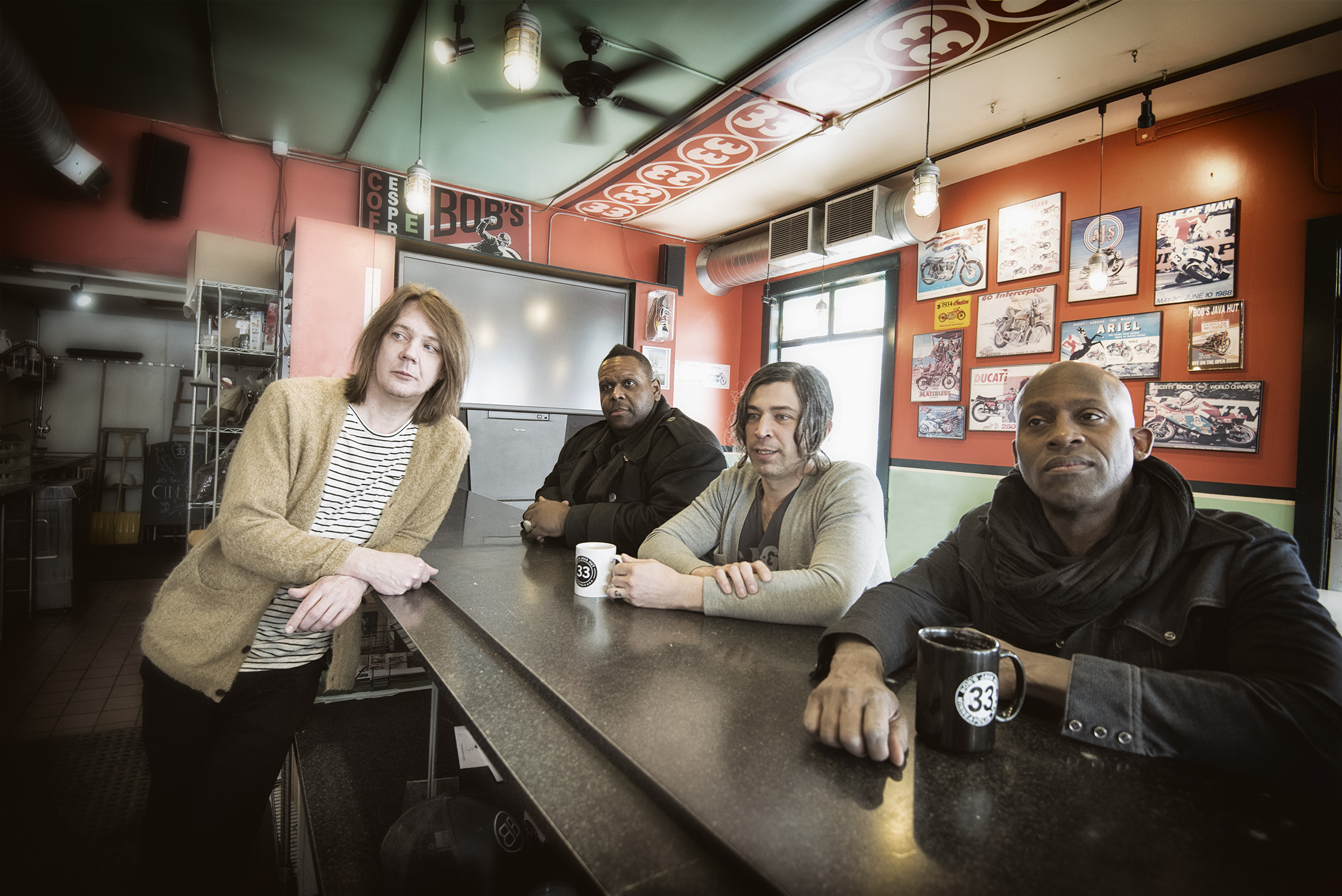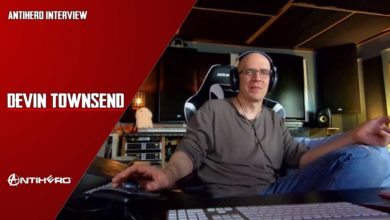In the ever-evolving landscape of metal music, few bands manage to carve out a niche as distinct and compelling as HIPPOTRAKTOR. Hailing from Belgium, this powerhouse quintet has been making waves with their innovative blend of progressive metal, post-metal, and atmospheric soundscapes. With their latest album garnering critical acclaim and a rapidly growing fanbase, HIPPOTRAKTOR is poised to redefine the genre’s boundaries. In this exclusive interview, we delve into the creative process, musical influences, and future aspirations of the band that is taking the metal world by storm.
ANTIHERO: Exploring Themes: The album “Stasis” delves into themes of corruption and resistance. What specific events or ideas inspired you to explore these themes, and how do you see the current political and social climate influencing your music?
CHIARAN: The backstory for “Stasis” originates from a general feeling, more than any specific event. There are so many things going on in our world at the moment, but one thing seems to be recurring: it’s almost never about the people, and it’s almost always about the money. Take music for example, most revenue from our plays on streaming platforms goes to everyone but us. That doesn’t seem fair now, does it?
ANTIHERO: From Inspiration to Music: Chiaran, you’ve described how the riff for “Renegade” came to you at a concert. Can you elaborate on the creative journey from hearing that riff in your head to developing it into a complete song? What steps and challenges were involved?
CHIARAN: I write, like most people these days, in front of a computer most of the time. I don’t always start with recording guitars, but with Renegade the first thing that came to me was a guitar part. After this I added programmed drums and bass to get a general feel for the vibe of the song. Most times, (when writing “Stasis” anyway), I’d have a couple of sections ready. For example, a chorus and a verse, with all instruments recorded to make sure they were working as a whole. These sections would be placed randomly on a timeline, not really having much to do with each other, yet. After this I’d start filling in the gaps and trying to make sure the storytelling made sense. The intro for Renegade was the last thing I wrote, mainly because I felt like the storytelling needed this. Written down like this, my workflow seems pretty straightforward, but nothing is further from the truth. Trial and error, with mostly error, seems to be my process.
ANTIHERO: Integrating New Vocals: Stefan, since joining HIPPOTRAKTOR, you’ve added a significant new layer to the band’s sound. What challenges have you faced in blending your vocal style with the band’s intricate musical arrangements, and how have you adapted your technique for this band?
STEFAN: I think the main goal as a musician should always be to serve the song. When Chiaran sends me instrumental demos, they are always so interesting that it’s sometimes difficult to pinpoint when a vocal part could actually improve a certain part. I think a singer should know when to speak and when to shut up. Keeping that balance is always the most difficult part. Luckily, since Chiaran and I have known each other for so long, I feel that I know where he would want to hear vocals and when the riffs should just speak for themselves. I just go by that feeling. In terms of new techniques, I’ve definitely discovered many new things I can do with my voice, certainly in terms of more dynamic screaming. Before I joined the band, I used to do very high screams all the time and didn’t really vary in pitch. Since I felt Hippotraktor deserved some brutal, low screams as well, I was forced to learn those and I’m very happy with this new set of skills I have learned from this process.
ANTIHERO: Connecting Through Narrative: “Stasis” is built around a central narrative. What techniques do you use in your music and lyrics to help listeners connect with the story and its characters?
STEFAN: Chiaran’s instrumental compositions always invoke a lot of visuals in my mind. I use these as a basis for knowing what the theme of a certain song should be and try to make sure that it logically follows the other themes. I think it makes sense to know what you are singing about instead of just singing words that sound cool, and it helps me to embody more what I’m saying. I can put a lot more emotion into a certain sentence when I know exactly what it means to me and I believe that when I feel something when I sing, the audience will feel it too.
ANTIHERO: Balancing Influence and Originality: Your music is often compared to bands like Meshuggah and Gojira, which speaks to the strength of your sound. How do you maintain your unique sound while drawing from such powerful influences? Could you share some of the specific techniques or approaches you use?
CHIARAN: I hardly ever consciously use other music as a reference to write my own. I feel very honored people compare us to the greats, but it was never my intention to sound like them. Instead, I get inspired by films, paintings, installations, but also real-world events. I’m interested in how things make me feel, and furthermore how to capture these feelings and summon them later through music and storytelling. I’m sure I am subconsciously influenced by all sorts of music, but I never want to start writing whilst telling myself: ‘man, I really want to write a song like X from artist X’. That would feel like a bad omen to me. My biggest musical influence is probably Steven Wilson, and I take it as a compliment that he’s never been mentioned in comparison, at least not to my knowledge.
ANTIHERO: Personal Resonance with Tracks: Could each member share which track from ‘Stasis’ they feel most personally connected to and explain why that track stands out to them? We’d love to hear about the personal experiences or emotions that make these tracks special to you.
CHIARAN: “Renegade” used to be my favorite track, and still is the most fun to play for sure. But these days it might be “The Reckoning”. It’s funny how these things shift to whichever you need most at this point in time in your life. Writing the album “Stasis” has probably been one of the most challenging things I’ve ever done, and it kind of left me in a strange place emotionally. I guess it’s only fitting that the last song on the album, which was also the last song to be written, soothes me the most right now.
KRISTOF: When I heard the album for the first time as a newcomer and an existing fan, The Indifferent Human Eye is the song that struck me the most. It takes you on a trip through a series of emotions. The contrast of clean and heavy spoke to me instantly. The apocalyptic feeling connects to me in a special way. The end of the song is the kick in the nuts that leaves a mark to remember.
STEFAN: The Reckoning: the first time I heard this track was a revelation. I thought this song could work perfectly as an instrumental, but at the same time I thought this provided an opportunity to write a type of vocal arrangement that we had never done before. It was a joy to complement this beautiful arrangement with a more delicate vocal, but I wasn’t sure how it would come across to the rest of the guys. I was very happy to hear that everyone really liked it, and it feels like the perfect ending to the album.
JAKOB: It is difficult to choose one single song as a favourite. If one would ask me the same question tomorrow, it is not unlikely that I would answer differently. Nevertheless, the dynamics of “The Indifferent Human Eye” still kick in the same way today as they did the first time I listened to it. I would like to invite musicians to explore its layers, revealing surprises at every turn and enjoy them as much as I did while learning to play this song.
ANTIHERO: Challenges in Production: Chiaran, as the album’s producer and one of the principal songwriters, what were the most complex parts of the production process for “Stasis”? Were there any particular technical or creative hurdles you had to overcome?
CHIARAN: Writing the album was the most challenging by far. It felt as if I tried to glue together impossible things at most times. Listening back now, after hearing these songs a million times, they sound pretty natural yet unpredictable to me, but I’m curious to find out if this is true or if I’ve just gotten used to them.
ANTIHERO: From Studio to Stage: Your music involves complex, layered sounds. What strategies do you use to effectively translate these intricate studio productions into compelling live performances?
CHIARAN: I was worried about this at first, but the new music seems to be working out pretty well live. This tells me the songwriting is robust, I guess. Not to mention the amazing musicianship of everyone who makes up Hippotraktor.
ANTIHERO: Lyricism in a Concept Album: Discuss the process and challenges of writing lyrics for a concept album like “Stasis.” How do you ensure that the lyrics not only tell a story but also match the emotional and thematic intensity of the music?
STEFAN: The hardest part is making sure that a certain sentence doesn’t only ‘read’ right, but that it also sounds right and vice versa. Hippotraktor is a very rhythmic band where everything revolves around the pulse of a song. There are always so many interesting things going on in the composition, that I choose to either accentuate a certain instrument’s rhythm or simply sing in a very static way because there are already plenty of rhythmic things going on. Lyrics and concepts are important to us, but the music is the main priority. A vocal part should always make sense musically first and lyrically second. With that in mind, once I have an idea of how a vocal part should sound rhythmically, I start thinking of words that match the amounts of syllables I need and I go from there. The actual lyrics I write, should sound coherent, intelligent and emotional. Every word should feel like there is no way that a different word would tell the story better. They have to be absolutely perfect. I don’t really know how the process works, but I let the music speak to me and write whatever comes to mind. I play the tracks and I start singing random words based on what I feel. Once I have a sentence ready, I record it and listen to how it sounds. If something doesn’t feel exactly right, I’ll start interchanging words or start from scratch. It’s a long and sometimes tedious process, but the payoff is really rewarding.
ANTIHERO: Feedback and Evolution: How has feedback from your fans influenced your perspective on “Stasis”? Can you share any specific comments or reactions that impacted you, and how do you value the relationship with your fans in shaping your music?
CHIARAN: Playing “Meridian” live throughout the years has taught me a lot. I’m always looking for clues when watching the audience. It’s very clear when something in the songwriting doesn’t work, but it’s equally obvious when it does. Aside from this, it’s very motivating to hear or read so many wonderful personal stories in relation to our music. I’m more devoted than ever to continue on this journey and connect with people through music.
ANTIHERO: Reflection of Personal Changes: How have the themes or the sound of “Stasis” been influenced by changes in your personal lives or shifts in your worldviews since your last album? And how do you see the current state of the music industry influencing your future projects?
CHIARAN: It’s always an interplay between events. Personal lives, the music industry, politics, the economy… they all influence each other. “Stasis” is a snapshot in time, a blueprint if you will, of how I was or wasn’t coping with things at this particular point in time. And our next album, will be exactly that: a snapshot. I think this is the beauty of recordings, they’re all collections of fleeting stories, captured for potentially endless repetition. This almost sounds as if I have a clue about what I’m doing.
ANTIHERO: Songwriting Collaboration: Describe how the five of you collaborate to create the complex structures in your music. What does a typical songwriting session look like, and how do you combine your individual ideas?
CHIARAN: This is where it gets boring. I write the music; Stefan writes the lyrics and vocals. Come recording time we all bring our musicianship to the table. This adds some flavor and spices where possible. But most of it was predetermined.
ANTIHERO: Concept Behind the Album Art: The visual elements of an album contribute to its narrative. Who was responsible for the artwork of “Stasis,” and what concept or story were you aiming to convey through the visuals?
CHIARAN: Before we started creating the artwork, I sat together with our graphic designer Sam Coussens, and we concluded that we were going to use Midjourney as a base for most images. I must’ve made more than 400 images of neoclassical domes before we found the right one. After this Sam added typography, grain, textures, and the graphic elements. Some parts of the artwork are photographs I took whilst I was in London to go see a Bruce Soord show.
Through visual storytelling I wanted to convey an image of grandeur, complementary to the album title “Stasis”. The image had to resemble an institute, set in its ways, crumbling under its own weight and inertia. I’m always really drawn to religious places like churches and mosques. These spaces seem to carry a mystical atmosphere to me. They also represent what we as species can accomplish when we work together. That’s why we went with a dome as the centrepiece for the artwork.
ANTIHERO: Future Musical Directions: With the completion of “Stasis,” what new directions or themes are you interested in exploring in future projects? Are there any musical styles or concepts you are eager to experiment with, and can you give us a hint about what we can expect from your next album?
CHIARAN: I’ve written a lot of new material so far. At this time, I’d say I’m exploring fragility and simplicity. Pretty much the opposite of what “Stasis” is. I’m curious to see where less might get us more. Atmosphere is also something I think we can elaborate on. I’m hoping there will be more contrast in some places, and less in others. We’re still, as any artistic endeavour should be, a work in progress.
ANTIHERO: Core Message for Fans: What central message or feeling do you hope fans will take away from their experience of listening to “Stasis”? How do you think the album’s reception will influence your future work?
CHIARAN: Imagine what we as a species could accomplish if we were to work together, instead of against each other. I know I’m cutting a lot of corners with such a statement, but this, in essence, is what I wanted to say with “Stasis”.
The reception of this album will surely influence us, I’ll be mainly on the lookout for how our audience responds when we’re playing these songs. We’ve played some of our new material live, and I’m learning a ton of things. I’d also like to thank Antihero Magazine for having us, and each and every one of you who’s reading my silly thoughts, coming to our shows, buying our merch and listing to our music. This really means the world to me. Thank you.







